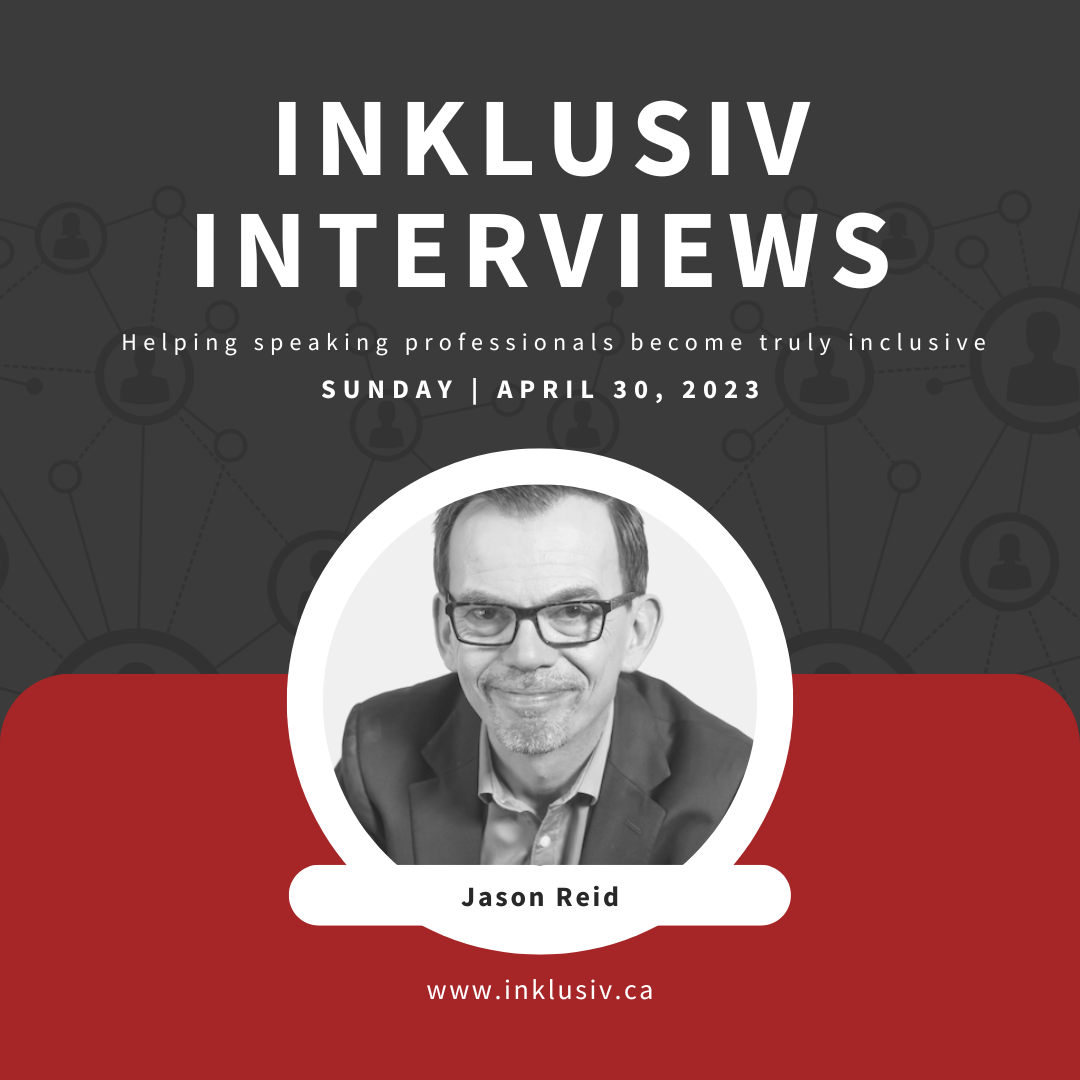Interview with Jason Reid

Every week, we meet with audience members with disabilities who are willing to come forward and share a little bit about their own personal journey and experiences, attending live, in-person, or virtual speaking or training events. Through their unique and generous perspectives, speakers, trainers, facilitators, and other communication professionals can hopefully learn about some of the things that they do well, but also (and maybe more importantly) about some of the things they could improve to provide an experience that is truly inclusive of everyone.
Meet Jason, an audience member who has Crohn’s disease and arthritis
So, without further ado, let’s dive right into this week’s interview with Jason Reid (he/him). Jason has Crohn’s disease and arthritis, and comes to us from Ontario, Canada.
Introductions
QUESTION 01 Can you tell us a bit about yourself, and how your disability might impact your experience, as someone who attends live in-person and virtual events?
My biggest issue with in-person conferences is often food. I can’t eat a lot of “healthy” food because it contains too much fibre (vegetables, fruit, salads, greens, whole grains etc.) Although I sometimes select “dietary restrictions” on the invite, the selection is often limited to vegetarian/gluten free/or other allergies.
Sometimes there is a comment space where I can explain my restrictions but this simply leads to more confusion. The information never seems to get passed on properly. By the time I get my plate everyone else has finished, and often the food is cold or I’m still not able to eat it. The other option is to simply pick around what I can’t eat. This means there are sometimes meals where I end up not eating at all. This affects my energy which may already be low.
Also I have to use the washroom more frequently than other people. Going more than 90 minutes without a bathroom break can be challenging.
I look perfectly healthy, but my legs can sometimes be in a lot of pain due to my arthritis. I always dread being asked to do physical exercises and activities that I know will add to the pain. Sitting for long periods without a chance to move around is also a challenge.
Things that ruin the experience
QUESTION 02 Thinking back on some of your experiences attending in-person or virtual events, what are some of the worst things speakers, trainers, and other communication experts can do to ruin your experience as an attendee?
I have often been asked to do physical activities that involve jumping, cheering, clapping etc. within a group dynamic that makes it very difficult not to take part. I attended one conference that featured a big-name “life coach” as the closing keynote. He had a twenty minute exercise that involved jumping up and down and clapping. The next two days I could barely walk and my hands were literally bruised.
I have been at other presentations where the speaker decided to ignore the clock with the expectation that the audience would stay in their seats the whole time. Sitting longer than 90 minutes without walking around or taking a bathroom break is really challenging for people in the audience.
Things that make a positive impact
QUESTION 03 Can you share some of the great things speakers, trainers, and other communication experts sometimes do that make a positive impact on your ability to fully enjoy your in-person or virtual event experiences?
As a person with two chronic illnesses, I often find conferences exhausting. I dislike being put on the spot to do a mentally challenging exercise paired with another person. It’s much better when that exercise is done at a table with a number of people participating.
If there are five or six people at a table, the ones who are mentally sharp and extroverted will do most of the work, while those who are more shy and introverted can blend into the background and provide a comment or two and feel as if they’ve been part of the process without being put on the spot.
Sharing a piece of advice
QUESTION 04 If you had one piece of advice to give speakers, trainers, and other communication experts, so their content became more inclusive of people who have disabilities, what would it be?
- Give audience members a break so they can stand, move (at their own pace) or use the washroom facilities every 90 minutes.
- Think twice about physical exercises and interactions which may be painful for some people. Don’t assume that they will voluntarily exclude themselves, as peer pressure in a business situation is a powerful force.
- Don’t put people on the spot by asking them challenging questions. The person may be mentally exhausted from having to take in information at the conference and would rather not be embarrassed in front of their peers.
Wrapping up
QUESTION 05 Thank you for sharing some of your insights with us today. As we wrap up our conversation, is there anything that you’d like to add, such as another thought, another piece of advice, another perspective, etc.?
Thanks for the opportunity to participate!
Connect with our guest on social
Interested in knowing more about our guest this week? You can follow Jason on LinkedIn.

About Denis Boudreau
Denis Boudreau is a consultant, trainer, and speaker specializing in digital accessibility and disability inclusion. He works with organizational leaders who want to equip their teams with the skills to create accessible websites and digital products – so no one is left behind. A Certified Professional in Web Accessibility (CPWA), Denis has trained thousands of web professionals over the past 20+ years and delivered hundreds of workshops in both English and French. He has helped leading brands like Netflix, Salesforce, and Victoria’s Secret embed accessibility into their digital strategies, empowering them to meet legal obligations, improve user experience, and connect with more people, more effectively.
